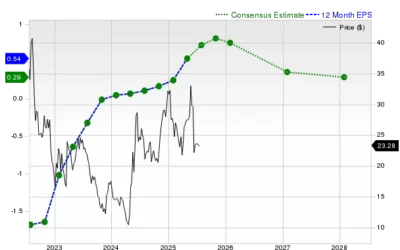Ford’s Quality Crisis: A Deepening Chasm Between Strategy and Execution
In a world where electric vehicles (EVs) are touted as the future of the automotive industry, Ford Motor Company stands at a critical crossroads. With significant stock fluctuations and a series of recalls, the situation raises pertinent questions: How much do recalls matter, and will Ford’s recent struggles influence its standing in an increasingly competitive market?
The Stock Saga
Ford’s stock has experienced notable volatility in recent months. Following a promising rise due to its ambitious EV strategy, the automaker has confronted a series of challenges that have led to plummeting stock prices. Investors are now left to decipher whether Ford is a long-term player in the auto industry or simply floundering under the weight of its own ambitions.
Recent Recalls: A Cause for Concern
The automotive industry’s ongoing recalls are more than just blips on the radar; they symbolize a company’s commitment to safety and quality. Ford has recently faced scrutiny due to mass recalls concerning various models associated with safety flaws. These recalls are not just a regulatory irritation; they have deep implications for brand reputation and customer loyalty.
Between faulty transmissions to defective airbag systems, Ford’s recalls illustrate a troubling trend. Often, a recall doesn’t just impact the vehicles taken off the roads; it reverberates through the company’s stock performance and consumer trust. When consumers start losing faith in the quality of a brand’s products, it fundamentally affects long-term sales potential.
Quality Crisis: Strategic vs. Executed
Ford has crafted an authoritative strategy focusing on innovation in electric vehicles, committing billions to new technology and sustainability goals. However, there appears to be a widening gap between this strategic vision and real-world execution. The ambitious goals set forth are admirable, but these recent recalls suggest that Ford’s operational finesse may not yet match its strategic aspirations.
This chasm underscores a critical question: can Ford effectively execute its electrification strategy while simultaneously managing quality control? The result of this imbalance might result in more than just temporary stock dips. A failure to solidify consumer trust may curtail its market share, particularly as other manufacturers enter the EV fray.
The EV Race and Implications
The automotive landscape is rapidly changing, with competitors like Tesla, Rivian, and even traditional manufacturers like GM and Volkswagen pouring resources into EV technologies. For Ford, the decision to pivot aggressively towards electrification is strategic but fraught with risks. If safety and quality concerns are not addressed, the reputational damage could slow down the company’s transformation into a leading EV player.
Analysts have voiced concern that Ford’s delay in addressing its quality issues might give other automotive companies a competitive edge. If Ford struggles to produce dependable vehicles during this critical transition, consumers may gravitate towards brands that have built their reputations on stringent quality control practices.
Future Outlook: Will Struggles Impact Growth?
Looking ahead, the question remains whether Ford’s recent struggles will have lasting effects on its future. Investors and analysts alike are pondering the firm’s sustainability amidst these quality concerns. Some industry experts suggest that while the current climate is challenging, Ford’s brand legacy could still attract consumers willing to support an American automaker during this transition period.
Moreover, initiatives such as smart urban mobility and partnerships with tech firms to enhance connectivity features are signs that Ford is attempting to adapt. If these initiatives can be carried out successfully, they may offset some of the damage caused by recalls. However, these benefits will only be realized if Ford can demonstrate a renewed focus on quality control and consumer safety.
A Way Forward
So what steps should Ford take to navigate these troubled waters? First and foremost, the company must take ownership of its quality issues. This includes transparent communication with consumers about problems, what steps will be taken to fix them, and how Ford plans to prevent such issues in the future.
Additionally, enhanced internal audits and quality checks can ensure that new vehicles meet industry standards before they hit the market. This investment in operations could help mitigate issues before they become widespread recalls, thus helping to preserve brand integrity.
Conclusion: The Road Ahead
Ford’s future hinges on its ability to align its strategic ambitions with operational execution. As the automotive landscape continues to evolve, so too must Ford rise to meet new standards set by both consumers and competitors. Facing a quality crisis while executing an ambitious electrification strategy creates a challenging but not insurmountable challenge. By focusing on quality control, enhancing customer trust, and staying true to its innovative roots, Ford could turn its recent struggles into a stepping stone towards a revitalized future.
The overarching message is clear: for Ford, it’s not just about recovering stock prices; it’s about repairing relationships with customers and restoring its brand reputation, forging ahead in a landscape where quality and innovation will reign supreme.







